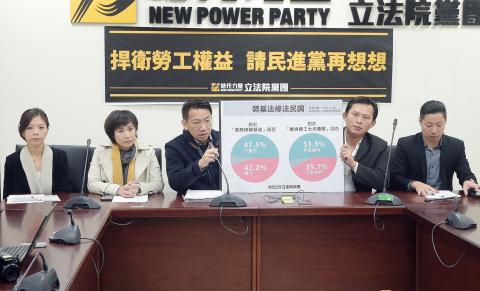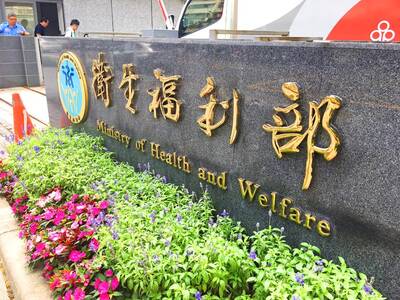The New Power Party (NPP) yesterday urged the Democratic Progressive Party (DPP) to “think twice” before rushing proposed amendments to the Labor Standards Act (勞動基準法) through the legislature.
Speaking at a news conference in Taipei yesterday morning, NPP caucus convener Hsu Yung-ming (徐永明) asked the DPP government to think clearly and reconsider its decision to push the amendments through the legislature.
Urging the DPP caucus to refrain from “abducting public opinion” by threatening to subject DPP members who fail to toe the party line to disciplinary measures, Hsu questioned the rationale behind the party’s decisions to shelve draft bills on marriage equality while passing the amendments to the act in a rush.

Photo: Huang Yao-cheng, Taipei Times
“Whose interests is the DPP safeguarding?” Hsu asked.
NPP Executive Chairman Huang Kuo-chang (黃國昌) blasted the DPP caucus’ move to initiate a motion to remove an article in the planned amendments that proposes heavy fines for large corporations that violate the act.
“I cannot believe the ruling party, which had repeatedly vowed to protect workers’ rights, initiated a motion today to delete the proposed Article 78-1 aimed at bolstering punishments that took us a lot of effort to put it on the version passed during previous legislative committee reviews,” Huang said on Facebook.
Huang said the removal of the proposed clause could see employees who violate the act get away with a mere NT$20,000 fine, and urged the DPP caucus to revoke the motion and respect the consensus reached during committee review.
According to the proposed addendum of Article 78-1, companies that violate the act would face fines that are proportional to their size, with the maximum amount being set at NT$5 million (US$156,484) for a company with more than 500 employees.
However, the DPP caucus is leaning toward dealing with violators through the proposed version of Article 79 of the act, which carries a fine of no less than NT$20,000 and not more than NT$1 million.
DPP spokesman Yang Chia-liang (楊家俍) urged Huang not to “pretend to understand things he does not,” saying that Huang’s inaccurate interpretations of the content of the proposed amendments shows his inability to review draft bills.
“The proposed changes to Article 79 ... also allow government agencies to increase the fine up to NT$1.5 million, after considering the corporate size, number of violators and the severity of violations,” Yang said.
Yang said the amended act would have a more comprehensive deterrent effect on employers.

POLAM KOPITIAM CASE: Of the two people still in hospital, one has undergone a liver transplant and is improving, while the other is being evaluated for a liver transplant A fourth person has died from bongkrek acid poisoning linked to the Polam Kopitiam (寶林茶室) restaurant in Taipei’s Far Eastern Sogo Xinyi A13 Department Store, the Ministry of Health and Welfare said yesterday, as two other people remain seriously ill in hospital. The first death was reported on March 24. The man had been 39 years old and had eaten at the restaurant on March 22. As more cases of suspected food poisoning involving people who had eaten at the restaurant were reported by hospitals on March 26, the ministry and the Taipei Department of Health launched an investigation. The Food and

A fourth person has died in a food poisoning outbreak linked to the Xinyi (信義) branch of Malaysian restaurant chain Polam Kopitiam (寶林茶室) in Taipei, Deputy Minister of Health and Welfare Victor Wang (王必勝) said on Monday. It was the second fatality in three days, after another was announced on Saturday. The 40-year-old woman experienced multiple organ failure in the early hours on Monday, and the family decided not to undergo emergency resuscitation, Wang said. She initially showed signs of improvement after seeking medical treatment for nausea, vomiting and diarrhea, but her condition worsened due to an infection, he said. Two others who

MEDICAL: The bills would also upgrade the status of the Ethical Guidelines Governing the Research of Human Embryos and Embryonic Stem Cell Research to law The Executive Yuan yesterday approved two bills to govern regenerative medicine that aim to boost development of the field. Taiwan would reach an important milestone in regenerative medicine development with passage of the regenerative medicine act and the regenerative medicine preparations ordinance, which would allow studies to proceed and treatments to be developed, Deputy Minister of Health and Welfare Victor Wang (王必勝) told reporters at a news conference after a Cabinet meeting. Regenerative treatments have been used for several conditions, including cancer — by regenerating blood cells — and restoring joint function in soft tissue, Wang said. The draft legislation requires regenerative treatments

Taiwanese should be mindful when visiting China, as Beijing in July is likely to tighten the implementation of policies on national security following the introduction of two regulations, a researcher said on Saturday. China on Friday unveiled the regulations governing the law enforcement and judicial activities of national security agencies. They would help crack down on “illegal” and “criminal” activities that Beijing considers to be endangering national security, according to reports by China’s state media. The definition of what constitutes a national security threat in China is vague, Taiwan Thinktank researcher Wu Se-chih (吳瑟致) said. The two procedural regulations are to provide Chinese